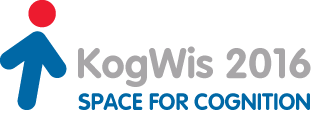Poster Session
The poster session will be held on Tuesday 27 September, 18:00-20:00. Please bring a printed poster, preferably in portrait format, max. size DIN A0 (84*119cm). Poster boards and pins will be made available before the afternoon coffee break. Please put up your poster during the coffee break.
Moreover, every poster presenter is asked to give a very brief (max. 1 minute) oral teaser presentation in the 17:30 session (without visual media).
Accepted Posters
Benjamin Angerer, Cornell Schreiber, and Stefan Schneider: Representational dynamics of problem solving in imagery: An exploratory case study
Pamela Baess and Christina Bermeitinger: Twin compatibilities: Studying spatial cognition with social Simon stimuli
Matthias-Philipp Baumann, Wiebke Schick, and Hanspeter A. Mallot: The impact of sleep on navigation and consolidation of survey knowledge
Lasse T. Bergmann, Silja Timm, Max Wächter, Anke Dittmer, Felix Blind, Carmen Meixner, Larissa Schlicht, Anja Faulhaber, Juhee Jang, Aalia Nosheen, Simeon Kraev, Max Räuker, Leon Sütfeld, Achim Stephan, Peter König, and Gordon Pipa: Moral decision making in autonomous vehicles
Martin G. Bleichner, Bojana Mirkovic, and Stefan Debener: Decoding spatial auditory attention using ear EEG
Artur Czeszumski, Ernesto Andrés López Montecinos, Chiara Carrera, Anette Aumeistere, Ann Xavier, Basil Wahn, and Peter König: Learned knowledge about the co-actor's behavior influences performance in a joint visuomotor task
Philipp Dehmel, Kerstin Jost, Aquiles Luna-Rodriguez, Mike Wendt, and Thomas Jacobsen: Quick and sustained inhibition of distractor elicited response activation in task switching
Hanna Drimalla and Isabel Dziobek: The role of facial mimicry in cognitive and emotional empathy and effects of autistic traits
Zoe Falomir and Eric Oliver: Towards improving users’ 3D spatial skills using a qualitative 3D descriptor and a computer game
Mareike Gann and Marc Himmelbach: The cortical network of usability evaluations for unknown tools
Tatiana Goregliad Fjaellingsdal, Esther Ruigendijk, Stefan Scherbaum, and Martin G. Bleichner: Neural correlates of semantic expectation in a conversation – A wireless EEG study of the N400 effect
Tobias Grage, Simon Frisch, and Stefan Scherbaum: The interaction dynamics of meta-control parameters and congruency proportion in spatial set shifting
Karoline Greger, Rebecca Albrecht, and Rul von Stülpnagel: Landmark preference during route encoding and retrieval
Tobias Jakubowitz, André Kowollik, and Ute Schmid: The impact of a humanoid robot’s action-selection strategy on humans’ perceived naturalness of interaction – A user study with NAO playing rock-paper-scissors
Marjan Daneshvar Kashkooli: Semantics of Persian spatial term ǰelo based on principled polysemy model
Pritty Patel-Grosz, Gerhard Jaeger, Matthias Holweger, and Nadina Kiss: Challenging the distinction between presupposition holes and plugs (presented by Natasha Korotkova)
Johanna Renker and Gerhard Rinkenauer: Learning to cope with uncertainty during the acquisition of mental models
Stefan Scherbaum, Tobias Grage, Moritz Walser, Katrin Hummel, and Maja Dshemuchadse: Dissociating components of cognitive flexibility in semantic space: Continuous measures, dynamic modeling and clinical assessment
Wiebke Schick, Marc Halfmann, Gregor Hardiess, and Hanspeter A. Mallot: Language cues in the formation of hierarchical representations of space
Laura Schmitz, Cordula Vesper, Natalie Sebanz, and Günther Knoblich: Co-representation of others’ spatial task constraints in joint action
Tanja Schultz, Felix Putze, Timo Schulze, Ralf Mikut, Wolfgang Doneit, Andreas Kruse, Anamaria Depner, Ingo Franz, Marc Aurel Engels, Philipp Gaerte, Dietmar Bothe, Christof Ziegler, Irene Maucher, Michael Ricken, Todor Dimitrov, Joachim Herzig, Keni Bernardin, Tobias Gehrig, Jana Lohse, Marion Adam, Monika Fischer, Massimo Volpe, and Clarissa Simon: I-CARE: Individual activation of people with dementia
Diana Schwenke, Maja Dhesmuchade, Cordula Vesper, Martin G. Bleichner, Stefan Scherbaum: Let’s decide together! Joint delay decision-making improves delay discounting
Pulkit Singhal, Aditya Agarwala, and Priyanka Srivastava: Do pitch and space share common code?
Michael Sprengel, Markus Hofmann, Mike Wendt, Aquiles Luna-Rodriguez, Sascha Tamm, Thomas Jacobsen, and Arthur M. Jacobs: Recent response conflict modulates early distractor processing
Anna Katharina Trapp and Manfred Thüring: Emotional effects on time estimates during intervals up to 5s
Rul von Stülpnagel and Christoph Hölscher: Predicting patterns in navigator-driven placement of landmarks for future wayfinding with Space Syntax


